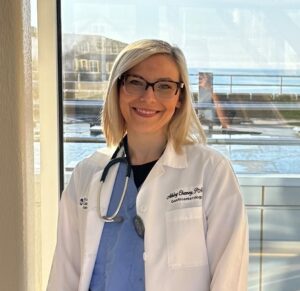
Gastroparesis, a condition characterized by delayed gastric emptying resulting from stomach paralysis, is growing in prevalence.1 While the exact cause can vary, diabetes is one of the possible etiologies for this disorder.2
August is recognized as Gastroparesis Awareness Month, with about 10 out of 100,000 men and 40 out of 100,0003 women affected by this condition, according to the National Institute of Diabetes and Digestive and Kidney Diseases. Additionally, similar symptoms of gastroparesis are experienced by about 1 out of 4 adults4, 5.
The American College of Gastroenterology (ACG) recently released clinical guidance indicating a potential link between functional dyspepsia (FD) and gastroparesis (GP), suggesting they may be part of the same medical condition.
Ashley Chesney, PA-C, a Board Certified PA at St. Luke’s Gastroenterology Associates in Duluth, Minnesota, said even though the symptoms in these two situations may be similar, 42% of people who were diagnosed with GP and 37% of those diagnosed with FD ended up being reclassified when checked with a special test.1
“It’s important to understand the connection and distinction between GP and FD,” Chesney said. “While GP can be more difficult to treat, FD can resolve more quickly with appropriate treatment.”
Chesney said that nonpharmacological therapy such as acupuncture has been found to reduce GP symptoms in diabetics, the ACG guidelines suggest its benefits for people with other causes of GP may be limited. The guidelines also highlight the importance of optimal glucose control for diabetic GP patients, as improved glycemic control has been shown to have positive effects on GP symptoms and meal tolerance.
CHALLENGES AND REWARDS OF BEING A PA IN GI
Chesney, who has been a Board Certified PA for 7 years, was the first PA in her GI practice, which now includes four PAs.
“Most patients are so appreciative of PAs,” Chesney said. “We get to build a rapport with patients over time and utilize shared decision-making.”
In 2022, 1.7% of PAs or 1,985, reported working in gastroenterology, according NCCPA’s 2022 Statistical Profile of Certified PAs by Specialty.
For Chesney, each day brings new challenges. She enjoys the variety and complexity of diseases she works with. Some of the more common illnesses she treats include irritable bowel syndrome (IBS), inflammatory bowel disease (IBD), chronic liver disease, gastroesophageal reflux disease (GERD) and GI bleeds.
She recommends pursuing a shadowing opportunity or completing a rotation in GI as a PA student for those who are considering pursuing a career as a GI PA.
“Establishing contacts with professionals in the GI world and seeking guidance can also be valuable for career development,” she said.
Chesney believes the PA profession will continue to have a significant impact in the field of GI.
“It has been amazing to see the difference our role has made in our practice alone.” Chesney said. “As our PA group has been able to provide more clinic care, this has opened up access to endoscopies provided by our MDs. I enjoy the variety and complexities of GI medicine and hope other PAs will consider pursuing this rewarding specialty.
————————–
[1] Camilleri M, Kuo B, Nguyen L, et al. ACG Clinical Guideline: Gastroparesis. Am J Gastroenterol. 2022;117(8):1197-1220. doi:10.14309/ajg.0000000000001874
[2] Kalas MA, Galura GM, McCallum RW. Medication-Induced Gastroparesis: A Case Report. J Investig Med High Impact Case Rep. 2021;9:23247096211051919. doi:10.1177/23247096211051919
[3] Jung HK, Choung RS, Locke GR III, et al. The incidence, prevalence, and outcomes of patients with gastroparesis in Olmsted County, Minnesota, from 1996 to 2006. Gastroenterology. 2009;136(4):1225–1233.
[4] Drossman DA, Li Z, Andruzzi E, et al. U.S. householder survey of functional gastrointestinal disorders. Prevalence, sociodemography, and health impact. Digestive Diseases and Sciences. 1993;38(9):1569–1580.
[5] Camilleri M, Dubois D, Coulie B, et al. Prevalence and socioeconomic impact of upper gastrointestinal disorders in the United States: results of the US Upper Gastrointestinal Study. Clinical Gastroenterology and Hepatology. 2005;3(6):543–552.

Ashley Chesney, PA-C
Ashley Chesney, PA-C, is a Board Certified Physician Assistant at St. Luke’s Gastroenterology Associates in Duluth, Minnesota, where she’s responsible for managing acute and chronic gastrointestinal diseases in both inpatient and outpatient settings. She is also credentialed at Lakeview Clinic/Hospital in Two Harbors, providing outreach clinic services. Chesney is a member of the American Academy of Physician Assistants and Minnesota Academy of Physician Assistants.

